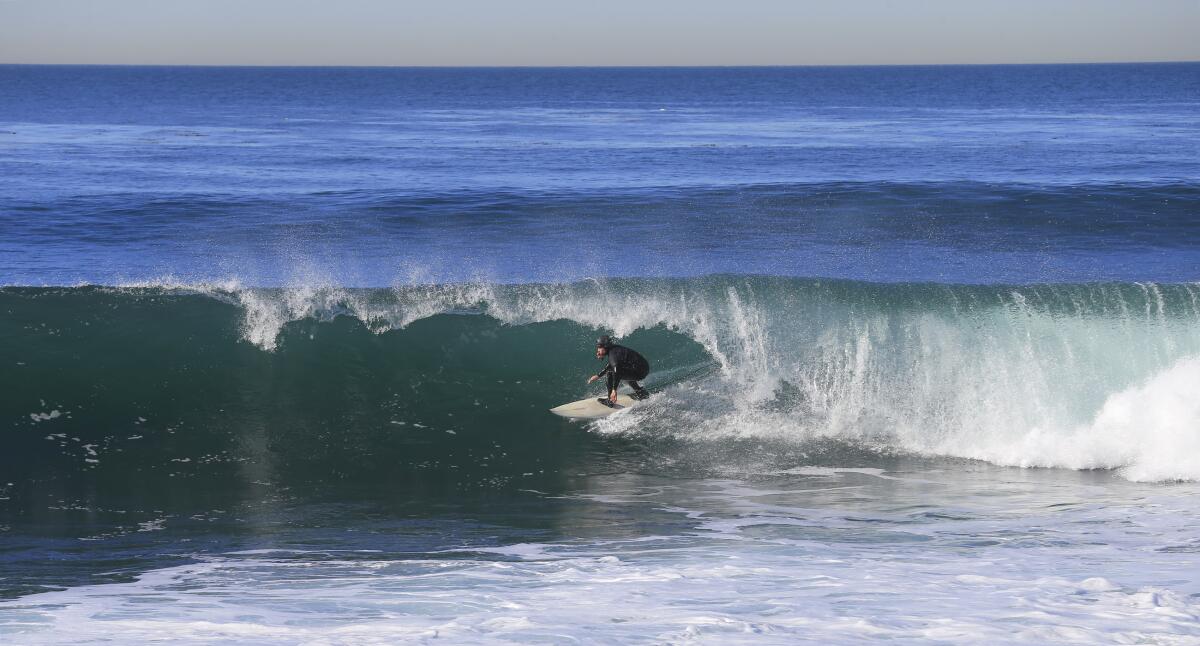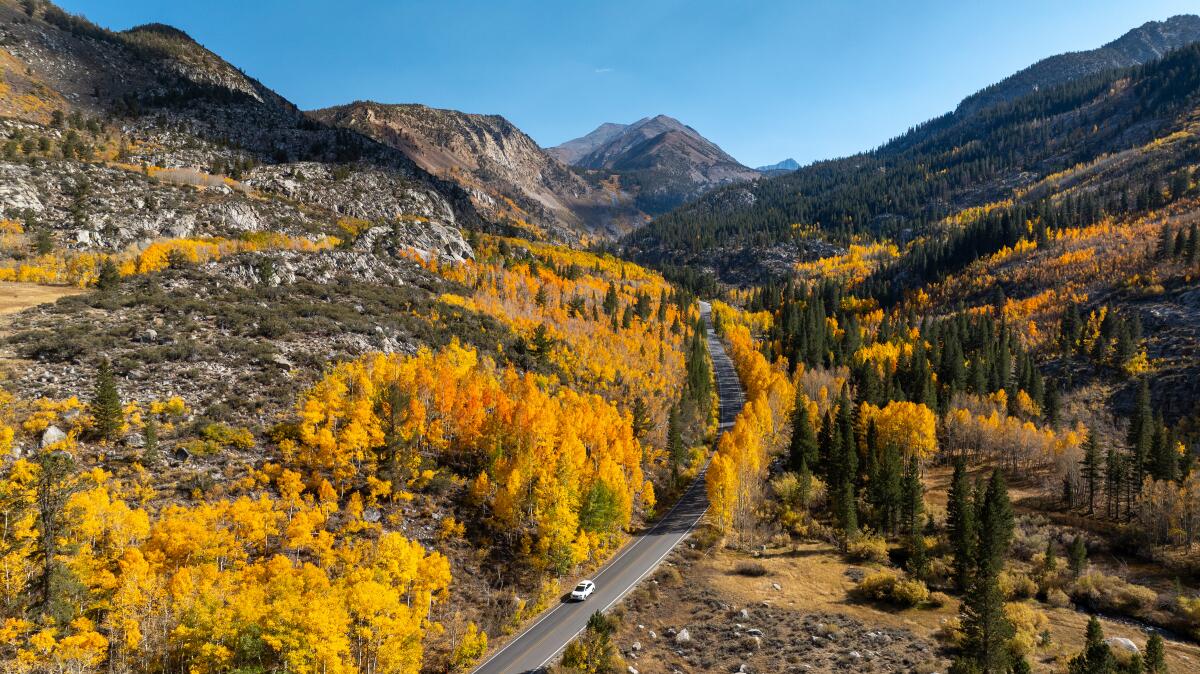A surfer gang at Lunada Bay may finally be wiping out

Good morning, and welcome to the Essential California newsletter. Here’s what you need to know to start your weekend:
- A surfer gang may be wiping out at Lunada Bay.
- The race for L.A. County D.A. is not even close, a new poll found.
- Find a breathtaking autumn spectacle in the Eastern Sierra.
- And here’s today’s e-newspaper
You're reading the Essential California newsletter
Our reporters guide you through the most important news, features and recommendations of the day.
You may occasionally receive promotional content from the Los Angeles Times.
Is this the last cowabunga for a surfer gang in Lunada Bay?
It’s understandable if the phrase “surfer gang” causes you to immediately think of Keanu Reeves and Patrick Swayze in “Point Break.”
Because that’s totally what happened to me when I first saw this story about the notorious Bay Boys by my colleague Clara Harter.
The controversial gang has sought to rule the waves of Lunada Bay for six decades by intimidating outsiders to keep them away. They’ve slashed nonlocals’ tires, thrown rocks at people coming down the cliffside trail and physically harassed surfers catching waves, Clara reports.
The level of harassment doled out by the Bay Boys was captured in an undercover video in 2015, when journalists from The Guardian visited Lunada Bay and did not receive a warm welcome, as you can see for yourself.
But enough people eventually got fed up with Bay Boys’ antics, and local officials agreed to settle a landmark lawsuit last month with a promise to protect public access to the bay.
The story of the Bay Boys may sound like a novelty in this day and age. A bunch of dudes forming a surfer gang and laying claim to a bay? OK.
But underneath the surface are bigger issues surrounding who is allowed to enjoy access to one of California’s biggest assets — the coast.
Here are some major points from Clara’s reporting that help put the Bay Boys’ stunts in context while raising questions over whether the settlement will really fix anything.

Behind the Bay Boys’ territorial streak
The bay is located near the upscale community of Palos Verdes Estates, which has a deep-seated culture of localism — the belief that local surfers own the break.
“Localism was a rampant problem along the California coastline from the 1970s through the early 2000s,” Clara reports. “But as coastal population and the popularity of surfing boomed, it became near impossible for locals to assert ownership over a particular break. Lunada Bay has remained the most notorious exception to this rule.”
Proponents of localism argue that nearby residents help maintain the natural beauty of the bay for the community, so why shouldn’t they close off access to outsiders who might trash the place?
But that argument has long been tinged with classism and racism, my colleague Clara reports.
Chris Taloa, a native Hawaiian surfer, told The Times that when he organized a paddle out at Lunada Bay on Martin Luther King Jr. Day in 2014, a local came up to him in blackface and told him, “You don’t pay enough taxes to be here.”
Sofly Matturi, a surfer from Long Beach, told Clara that he feels racially charged aggression when he paddles out at Lunada.
“It’s like half is localism, half is racism,” said Matturi, who is Black. “Either way, they don’t like me.”
A vibe check at Lunada Bay
Some surfers told Clara they are not holding their breath that the settlement will end bullying at the bay.
While the settlement includes putting up signs making it clear the bay is open to the public, it doesn’t mention any new strategies for responding to incidents of harassment, bullying or localism.
That’s a big problem considering that correspondence records show that Palos Verdes Estates officials dismissed the Bay Boys’s localist harassment as an “urban legend” in 2016 and discussed ways to avoid public and media scrutiny.
Back when journalists for The Guardian visited the bay in 2015, they later stopped by a police station and were told by officers that police would only respond if a law was broken.
But John MacHarg, a Palos Verdes native who opposes the Bay Boys’ bullying, told Clara the settlement provides a chance to turn things around at Lunada Bay.
“The moral of the story is: Get out there and go surf, break it open,” he said. “The door has been opened, but if nobody goes through the door, it’s not going to make any difference.”
The week’s biggest stories

Harris and Trump are ‘microtargeting’ voters through appearances on podcasts, ‘The View’ and Howard Stern
- The two presidential candidates are hoping to reach specific blocs of voters through nontraditional media, illustrating how the campaigns are leaving no stone unturned in the final month of the election.
- In other election news, Harris leads Trump in California, but her Latino support has softened, a poll found.
- Trump is holding a rally on Saturday in the Coachella Valley, even though he will likely lose California by millions of votes.
- If Trump wins the White House, Californians want their next senator to fight back, according to a poll.
- Obama this week blasted men for finding “all kinds of excuses” to avoid voting for a female president.
Hochman’s lead over Gascón grew to 30% in a new D.A.’s race poll
- Fifty-one percent of likely L.A. County voters would choose Nathan Hochman, and 21% would cast a ballot for Gascón, according to a survey from the UC Berkeley Institute of Governmental Studies, co-sponsored by The Times.
- Gascón tried to cut into Hochman’s lead during a contentious debate this week.
- These maps show where Gascón and Hochman need to win over voters.
Hollywood veterans get brutally honest about mentoring the next generation amid industry turmoil
- Longtime Hollywood workers said they feel an obligation to “speak truth to facts” with people trying to break into the entertainment industry right now.
- Some training programs and mentorship groups have been reevaluating their approach as the industry struggles and jobs remain scarce.
Elon Musk unveiled a prototype for a driverless robotaxi
- Dubbed the Cybercab, the futuristic, metallic silver vehicles lacked steering wheels, pedals and rearview mirrors. Musk said the fully autonomous vehicles would hit the road by next year.
- The news comes as increased competition in the electric vehicle space has squeezed Tesla’s sales.
More big stories
- A twin-engine plane that crashed on Catalina Island was reportedly not cleared for takeoff.
- LAPD rookie cops face hazing by shaved heads and other “rites of passage,” a report found.
- Dozens of patients sued a former OB-GYN and Cedars-Sinai, alleging misconduct.
- UCLA is drawing some criticism for a “militarized campus” after violent spring protests.
- Math and English test scores for California student are rising, but pandemic losses remain stark.
- L.A. faces a quake mystery, with this year bringing the most seismic activity in decades. Why now?
Get unlimited access to the Los Angeles Times. Subscribe here.
This week’s must reads
In the heart of Appalachia, a distant cousin of JD Vance leads an opposing “authentic hillbilly” movement. “He cosplayed a hillbilly and tokenized himself as the golden child who worked hard to overcome adversity,” the cousin, Terra Vance, said. “What he’s peddling now — what he is doing to other marginalized groups — is exactly what has always been done to us.”
More great reads
- In their own voices, Israelis and Palestinians reflect on a catastrophic year.
- Will an influx of Californians into Arizona tilt the battleground state’s politics?
- How L.A. became America’s largest jail system.
- “Like freeing a ghost”: A sailor’s strange and wondrous journey back from Pearl Harbor.
- An L.A. River champion offers a vision for reimagining the waterway — and the city’s future.
How can we make this newsletter more useful? Send comments to essentialcalifornia@latimes.com.
For your weekend

Going out
- 🍁 The brilliant autumn foliage in this Eastern Sierra paradise is drawing a global crowd.
- 🍲 Here is a highly specific guide to San Francisco dining.
- 💪 Strength training may be the key to longevity. Here’s how to do it safely as you age.
- 🚲 Going to CicLAvia this weekend? Here are 10 spots to eat or drink along the route.
- 🤡 Here’s why “Joker: Folie à Deux” became a creative and box-office flop, our critic explains.
- 💕 Younger daters are tired of swiping. A host of new L.A. startups is vying for their attention.
- 🥾 Looking for a good fall hike? The Times will hold a subscriber hike with outdoors reporter Jaclyn Cosgrove on Saturday, Oct. 19.
Staying in
- 😂 What was the first episode of “SNL” really like? Here’s a fact check of “Saturday Night,” now in theaters.
- 🍷 “Sideways” turns 20. A generation later, are the kids drinking Merlot?
- 🦸 HBO’s “The Franchise” marvels at what a nightmare it is to make a superhero movie, our critic writes.
- 📚 Comics master Adrian Tomine draws insights on the creative process.
- 🧑🍳 Here’s a recipe for buttermilk soup with radishes and peppery green oil.
- ✏️ Get our free daily crossword puzzle, sudoku, word search and arcade games. How well did you follow the news this week? Take our quiz.
Released this week, what is the title of former First Lady Melania Trump’s memoir? Plus nine other questions from our weekly news quiz.
Have a great weekend, from the Essential California team
Hunter Clauss, multiplatform editor
Check our top stories, topics and the latest articles on latimes.com.
Sign up for Essential California
The most important California stories and recommendations in your inbox every morning.
You may occasionally receive promotional content from the Los Angeles Times.





